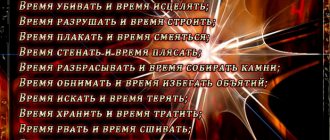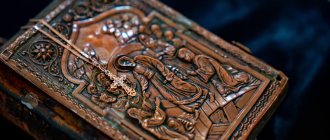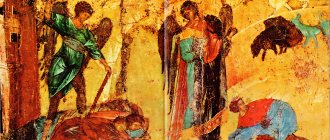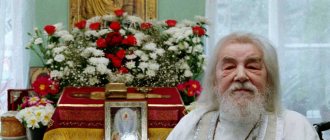The Mystery of Ecclesiastes
Almost every Book included in the biblical canon has an indication of the name of its author. Therefore, when introduced to the Book of Ecclesiastes, many have no doubt about who wrote it: “Ecclesiastes is probably the name of some prophet.” Is this judgment correct? What does the book of Ecclesiastes say and why is it important for Christians?
Biblical King Solomon (medieval Catholic fresco)
Ecclesiastes: what or who is this?
In the original Hebrew the text is called Kohelet - “speaker in the congregation”, “preacher”. The literal translation in Greek is Ecclesiastes (“Εκκλησιαστής”). Thus, Ecclesiastes is not a proper name. In Russian Orthodoxy, by tradition, it is the Greek word that is preserved. So the full title of the book of the Synodal translation states: “The Book of Ecclesiastes, or the Preacher.”
"Preacher. This is a kind of new quality compared to a prophet, teacher, king, judge. Bible prophecy, teaching, and storytelling are now perceived as preaching. The teacher is talking about something, about someone, the preacher is saying something to someone” (Archpriest Gennady Fast).
If Ecclesiastes is not a name, then who is the author of the Book?
There is still no generally accepted opinion about the authorship and time of writing of the book. Although Orthodox Tradition believes that this creation belongs to the Jewish king and prophet Solomon (10th century). It is believed that he wrote it at the end of his long life. This is indicated by the words of the author himself, who calls himself the son of David and king in Jerusalem.
However, in the 17th century, the Dutch theologian Hugo Grotius expressed doubts about the authorship of King Solomon. This opinion was supported by many Protestant scholars who doubt the authenticity of the Book. Many assumptions have been made about the time of its writing. In support of their judgments, a description of disasters unknown in the fate of Solomon was given. The use of some words in the Book of Ecclesiastes was considered unusual for the Solomon era. Thus, the German historian Friedrich Delitzsch indicated the time of compilation of the Book as the period from 464 to 332 BC. The German historian Heinrich Graetz attributed it to the 1st century BC.
For Orthodox Christians, the question of the authorship of the Book of Ecclesiastes is of secondary importance. The main thing here is the very meaning of the Book, its content and teaching.
PORTAL CONTACTS
Who among us has not heard and repeated these expressions: “vanity of vanities, all is vanity”, “get back to square one”, “time to gather stones”, “there is nothing new under the sun”... Many people know that this is from the book of Ecclesiastes; that the book of Ecclesiastes (Ecclesiastes), or the Preacher, is included in the Bible. Those who have read this book in most cases like it - its melancholy poetry combined with bright, unexpected imagery. Others are perplexed: what is Christian in this book, why does the Church accept it as one of the sacred books? The very small book of Ecclesiastes (in Hebrew, Kohelet) in comparison with other Old Testament texts was studied and commented on by the holy fathers of the Church, and many volumes of research in later times were devoted to it. And we will talk about it with Archpriest Gennady FAST, rector of the Church of Saints Equal-to-the-Apostles Constantine and Helen in Abakan (the capital of the Republic of Khakassia), biblical scholar, author of many books about the Old Testament, including the recently published “Commentary on the Book of Ecclesiastes.”
| Archpriest Gennady Fast was born in 1954 in the Novosibirsk region, into a deeply religious Lutheran family of exiled Russian Germans, and was named Heinrich. After being expelled from Karaganda State University for religious beliefs, he studied at the Faculty of Physics at Tomsk University, then worked at the Department of Theoretical Physics. Before graduating from university, he came to Orthodoxy and was baptized with the name Gennady. After being expelled from Tomsk University, he became a priest. He served in Tuva, the Kemerovo region, and the Krasnoyarsk Territory. For many years he was the rector of the ancient Assumption Church in Yeniseisk. He trained dozens of Siberian priests. He was and remains one of the brightest and most famous Orthodox missionaries of our time. Biblical scholar, author of a number of books that have received wide circulation. Currently, he is the rector of the Church of Saints Equal-to-the-Apostles Constantine and Helen in Abakan. |
— Father Gennady, let's start with the authorship. For many of our readers it will be surprising to say that the author of the book of Ecclesiastes is the son of King David, the builder of the Jerusalem Temple, the wise King Solomon; in other words, that the nameless[1] Preacher and Solomon are one and the same person. From your Interpretation it can be understood that in his old age Solomon left his royal palace, his wealth, dressed in rags, took a staff and went to wander the roads, reflecting on the futility of all earthly things. But this is not in the Bible, just as there is no indication of Solomonic authorship. The third book of Kings (chapter 11) says that Solomon died and was buried in Jerusalem. Moreover, he dies in sad circumstances: under the influence of his wives, he fell into idolatry and aroused God’s wrath. Only for the sake of David, Solomon’s father, the Lord spares Israel and Jerusalem these days. And nowhere is it written that Asmodeus threw Solomon far from the Holy City, and Solomon went to wander along the roads...
— Indeed, there is a version that the book of Ecclesiastes arose after the Babylonian captivity, that its author was a late Hellenized Jew; This is evidenced, in particular, by the author’s philosophical disposition, which is much more characteristic of ancient culture than Jewish culture. Likewise, philological analysis of the text makes us think about its later origin. Well, this hypothesis can neither be proven nor completely refuted. But personally, I adhere to the traditional, patristic point of view: the author of the book of Ecclesiastes is Solomon. In patristic literature, the book of Ecclesiastes has always been perceived as the repentance of King Solomon, as a book written after he sinned with idolatry.
As for walking with a staff on the roads, this is already an ancient Jewish tradition, it is contained in the Haggadah[2]. The Holy Fathers accepted ancient Jewish traditions, many of these traditions passed into patristic literature. I used this image - the image of a wandering king, a king who rejected the kingdom for the sake of a beggar's bag - as an artistic design for the book, as a background for the thoughts of Ecclesiastes - Kohelet. I think this is how this book could have been born.
- But in the text of Ecclesiastes there are no repentant motives at all - such as in David, for example, in the 50th Psalm.
- Yes, this is not David’s repentance! This is most likely the repentance of a philosopher rethinking his entire life. The word “repentance” here is most easily used in its Greek form: metanoia, change, alteration. There were several changes in Solomon's life. His ardent love for God and for the Wisdom of God in his youth, an active life in maturity and then, at the end of his life, satiety with wealth and pleasures, which led to dubious actions. We do not fully know how deeply he plunged into idolatry, but it is clear that he was stuck in his polygamy and flirtation with paganism. And then he suffers not such heartfelt contrition as his father David, but a kind of philosophical rethinking of human existence.
| And I became great and rich more than all those who were in Jerusalem before me; and my wisdom remained with me. Whatever my eyes desired, I did not refuse them, I did not forbid my heart any joy, because my heart rejoiced in all my labors, and this was my share from all my labors. And I looked back at all my works that my hands had done, and at the labor that I labored in doing [them]: and behold, all is vanity and vexation of spirit, and there is no profit from them under the sun! Eccl. 2, 9-11. |
- Why did he, a completely Old Testament Jew, have a problem with the meaning of life? Why did it not arise among Abraham, Isaac, Jacob... Moses, Joshua, Samuel, David and others?
“It’s the same as asking why it was Einstein who created the theory of relativity.” Or why “Eugene Onegin” was written by Pushkin. There are different people, each with their own path, their own purpose on this earth. The Old Testament righteous men listed were deeply religious, but none of them chose wisdom as the main principle of life; did not ask God for an understanding heart, as Solomon asked in Gibeon (see: 3 Kings 9 ). Having received wisdom from God, Solomon served her all his life, and he never betrayed her! He served her when he judged people, when he composed the Song of Songs, when he wrote his Proverbs - the entire corpus of Solomon's books can be called books of wisdom. Therefore, it is not surprising that it is Solomon who has a philosophical problem—the problem of the meaning of life in general.
| And I said in my heart: “And the same fate will befall me as a fool: why then have I become very wise?” And I said in my heart that this too is vanity; because the wise will not be remembered forever, nor will the fool; in the days to come everything will be forgotten, and alas! the wise man dies equally with the foolish man. Eccl. 2, 15-16. |
- But you can say it differently. The predecessors of Solomon in Sacred history, the righteous of the Old Testament, were deprived of painful reflection. They knew how to live. They loved life. They were not oppressed by her finitude, not frightened by death: they died surprisingly calmly and were very little interested in what would happen to them after death, and whether there would be anything at all. They rejoiced when their children were born, and it did not occur to them to groan: why was this child born, because he will die anyway. They were healthy after all! Compared to them, Solomon looks like such a... reflective intellectual. Almost Chekhovian...
“Solomon’s predecessors are really not like him.” They lived by faith and love of life, which suited them well, and they were not philosophers. The philosophical perception of the world is not at all characteristic of ancient Israel. The books of the Old Testament are not philosophical, they are historical and prophetic books. Ecclesiastes is something of an exception. It’s as if he really belongs to another culture. This gave biblical criticism reason to doubt his identity with Solomon. Ecclesiastes, Kohelet, and, in our opinion, Solomon, are a person who, perhaps, did not have deep religiosity. The Song of Songs does not mention the Creator, and Solomon's Proverbs, with light editing, could be used by atheists. God is mentioned there, but He is not in the center, and He does not determine everything. Solomon in this sense is consistent, he is like this, and cannot be otherwise. It is no coincidence that you drew a parallel between him and the Russian intellectual of the late 19th century. In that century we had St. Philaret of Moscow, there were the Optina elders, Theophan the Recluse and, in the end, Gogol and Dostoevsky, who, although not evenly or smoothly, led their readers along the path of the Orthodox faith. However, there was also Leo Tolstoy, and it is very difficult to answer the question of what this count lacked in Orthodoxy, why he disliked him so much. Regarding Kohelet, we can say that God is using him—by the way, God also used Lev Nikolaevich. I know many people who read Tolstoy in Soviet times, because he was quite accessible, and through him they thought about deep spiritual problems. And this served as an impetus, ultimately these people came to Orthodoxy. On the contrary, I do not know a single Orthodox person who has read Tolstoy and left the Church for Tolstoyism. If only Lev Nikolaevich knew this!..
This world—the world of unsettled, restless intellectual consciousness—it really exists, and it is not only present in the Silver Age, it is actually very ancient. He did not bypass the land of Israel: we see such a man here. And by God’s Providence, through him a whole series of sacred books arise, books that have become canonical.
| I spoke in my heart about the sons of men, so that God would test them, and so that they would see that they are animals in themselves; because the fate of the sons of men and the fate of animals is the same fate: as they die, so these die, and everyone has the same breath, and man has no advantage over cattle, because everything is vanity! Eccl. 3, 18-19. |
— Why, on what religious basis did the book of Ecclesiastes become such?
“She became such because she, in essence, asks a question.” Ecclesiastes is a question, and the answer is the Gospel. Neither Moses nor David ask a question; what they receive directly from God is enough for them. The prophet Elijah says: As the Lord God of Israel lives, before whom I stand (3 Kings 17: 1). What questions does he have? And Solomon... He was not an atheist, of course, he was a believer, but he approached the very edge of an abyss - an abyss in which God no longer exists. At some moments God seems to disappear from him. But God needs just such a person in order for the question to be asked. Solomon is mercilessly sincere, and he will not console himself with the usual words: “God will provide... For everything is the will of God...”. By the way, he is not completely alone. Long-suffering Job also asks questions and also cannot console himself with these words. And the prophet Habakkuk does not console himself with them; he climbs the tower to express his claims to God. Solomon, unlike Job and Habakkuk, has no complaints against God. They had these complaints, perhaps because they felt God very deeply. Solomon, in comparison with them, is a secular man in a certain sense, and his claims are not against God, but against a life in which there is no meaning. He had everything that this life could give: untold wealth, power, fame, honor - but now he sees no meaning in anything. The book of Ecclesiastes and Solomon is not even about the meaning of life, but about its meaninglessness. The author's view is honest, free from any self-delusion, he sees this nonsense without embellishment. What is the revelation of the book of Ecclesiastes? The paradox is that it leaves a person without God. And makes him see clearly what life is like without God. That is why this text is so dramatic, there is anguish, intensity, drama of the human soul that has lost its meaning.
— I was struck by the phrase from your book: “Only in the Ecclesiastes desert can you find a gospel oasis”[3] . However, it also causes bewilderment. Is it really possible to come to God only through the state of Ecclesiastes, through the experience of meaninglessness and emptiness? Aren't there other ways?
— It’s not only you who are perplexed. One journalist was already indignant at this statement of mine: they say, neither Sergius of Radonezh, nor Seraphim of Sarov, nor John of Kronstadt needed any Ecclesiastes desert to fill the source of living water. But these words, which I nevertheless left in the book, do not necessarily imply a chronological sequence: first the experience of desert, emptiness, nonsense, then the Gospel. This happens to some people in exactly this order, but not to everyone. The saints listed here experienced the Ecclesiastes desert in this sense: they deeply felt the vanity, the futility of this world and rejected it. Otherwise they would not have had the revelations that were given to them. Whoever is completely satisfied with this world will not become either Seraphim or Sergius, even if he knew the entire Psalter by heart. You have to experience this from the inside: how empty this world is without God. In order to later become rich in God (cf. Lk. 12, 21).
The book of Ecclesiastes is very modern, very relevant for our time. It defines a person participating in the race of consumption, in the pursuit of pleasure, success, empty amusements[4]. Today I know people who came to Christianity precisely through the book of the Preacher. A person who reads it sees a godless world and goes to look for God and finds him in the Gospel. It is a pity, of course, that people (including, alas, believers) read little now or prefer to read something easier. But the book of Ecclesiastes remains one of the most popular; it is readable, although perhaps not fully understood.
| For to the man who is good before Him, He gives wisdom and knowledge and joy; but he gives the sinner the trouble of collecting and hoarding, so that [afterwards] he can give it to the good before the face of God. And this is vanity and languor of spirit! Eccl. 2, 26. |
- What do you need to understand?
— A kind of key to the book of Ecclesiastes is the word itron . It is found nowhere else in the Bible and means "residue" or "profit." Dry residue, as we sometimes put it. The answer to the question: “What will we get from all this?” Ecclesiastes needs an answer to this question, and he tests everything: wealth, poverty, women, wine, creative work, power... and even piety. And the bottom line is nothing: everything is “vanity of vanities”[5] and vexation of spirit.
| For what will a man have from all his labor and the care of his heart, that he labors under the sun? Because all his days are sorrows, and his labors are anxiety; even at night his heart does not know peace. And this is vanity! It is not in man’s power to eat and drink and to delight his soul from his labor. I saw that this too was from the hand of God. Eccl. 2, 22-24. |
- How is there nothing left? After all, Solomon built the Temple! On the very first day a miracle was performed in the Temple, and Solomon prayed for his people, prayed for them for centuries to come - these pages (see: 1 Kings. It is impossible to forget. The Temple was still standing at that historical moment, no one had destroyed it yet!
After all, Solomon built the Temple! On the very first day a miracle was performed in the Temple, and Solomon prayed for his people, prayed for them for centuries to come - these pages (see: 1 Kings. It is impossible to forget. The Temple was still standing at that historical moment, no one had destroyed it yet!
— The temple stood. But this did not change anything. This happens often in life. When we read Solomon's prayer at the consecration of the Temple, we see that it is overflowing, this is truly a shekinah - a divine presence. And now there is nothing left of this. Solomon-Ecclesiastes does not remember the Temple even once! (This, by the way, makes biblical critics doubt the authorship of King Solomon. But in a certain sense, this does not matter to us.) The Apostle Paul warns: it is quite possible, while preaching to others, to remain unworthy (cf. 1 Cor. 9:27 ). Such tragedies happen to people, even to priests, there is such a thing: burnout. I saw burnt out priests, among them there were talented, intelligent people who were not at all devoid of moral qualities. And they were all very zealous in their time. And then internal disappointment came, secularism entered life... And the same thing happens with Ecclesiastes. He built the Temple, but did not gain the highest benefit - itron.
“But the burnt-out priest is most likely to blame for this himself, and Ecclesiastes, therefore, too.”
- Maybe. If Solomon had always maintained the same mood as on the day of the dedication of the Temple, would idols have appeared in Jerusalem? And they appeared. Yes, the story of Ecclesiastes is the story of the fall. Or devastation. It was full, but became empty. And in everything under the sun (Eccl. 1, 3 et seq.), this itron is not present. Because itron is actually something that is higher than the sun.
But besides the word “itron” there is another key word necessary for understanding the book of Ecclesiastes: Comrade . Unlike the first word, it is common in the Hebrew language and in the Holy Scriptures, starting with the first chapters of the book of Genesis. It means "good" or "good." Tov is what is good. Everything that, as we have already said, Solomon experienced—wealth, fame, women, wine, work, and piety—is actually good, Comrade. Reading the text of Ecclesiastes, we see several times how he tries to climb to the top, to find the desired itron - but for some reason he cannot do it. And, not wanting to fall completely down to where there is sin and death, he slides into some average universal happiness, into this very comrade. But for some reason the philosopher cannot remain in this universal good for a long time, and again he climbs to the top, and breaks down, and seeks consolation in the universal good, and again does not find it. And this hovering between ordinary good and the highest incorruptible benefit determines the state of the soul of Kohelet, the philosopher.
| This is also what I found good and pleasant: to eat and drink and enjoy good things in all his labors, as someone works under the sun all the days of his life that God has given him; because this is his share. Eccl. 5, 17. |
— Was it not this drama that attracted Christian ascetics and ascetics to the book of Ecclesiastes?
“It served as a kind of justification for what they were doing.” After all, Ecclesiastes is a book about the meaninglessness of life in its, in general, positive manifestations. Please note that the author does not talk about suffering, illness, crime, war, etc. It reflects the normal, positive state of a person, what is commonly called happiness. Happiness is that same thing in which there is no iron. But in the Gospel there is no concept of happiness at all; it has another concept - bliss. Bliss is itron, the highest acquisition. Remember the rich young man who left Christ sad? (see: Matthew 19, 16–22; Mark 10, 17–22; Luke 18, 18–23). He was offered tov - average well-being and piety (keep the commandments). He had this and was not satisfied. But he could not 19:31
Christian ascetics consciously abandoned the world in its vain manifestations, denied themselves innocent pleasures, seemingly created by God himself, and this was not a refusal of sin. This is a refusal of tov, of good - because in this good there is no highest good - itron.
— You devoted an entire chapter of your book to the Ecclesiastes antinomies, the most famous of which is the time to scatter stones and the time to gather stones (Eccl. 3:5). What is their moral and spiritual meaning?
- There is a time for everything, and a time for every thing under heaven (Eccl. 3: 1) - this is about the deep meaning of our life. A person very often does not know what time is now, or believes that all his time is only for one thing. But life is dialectical, after all, the laws of dialectics have not been canceled. And a person, a Christian, who lives in the Holy Spirit, must be especially sensitive to what the time is now. His actions can be the opposite: he can punish or forgive, beat or heal. A well-known incident from the life of St. Luke of Crimea (Voino-Yasenetsky): he saw Komsomol members placing a ladder against the wall of the church in order to climb onto the roof and remove the cross. The saint shook the stairs in anger, they fell, broke, and broke. He took them to the hospital and treated them: everything has its time. Or Admiral Ushakov, about whom many still ask why he is glorified as a saint, what, in fact, is his holiness: his cannons crush the Turkish squadron, the Turks are drowning, he sends his sailors on boats to save these Turks, pull them out of water: time to have mercy. Divine Sophia, Wisdom manifests itself in a person if he knows what the time is now.
— The book of Ecclesiastes carries a very powerful moral charge. The author is a very moral person, in other words, a righteous man. A wise life for him is a righteous life. But here is the statement that righteousness has no meaning... How does this fit together?
- This is the tragedy of Ecclesiastes! He is unable to live immorally, he calls for piety, but at the same time he sees the meaninglessness of piety without God. Here we can recall our communists, among whom there were people of high morality, there were those who gave their lives in the war... But those whom, at least I found, could no longer believe in any communism. They called on people to work, to live honestly, to live according to the laws of communist morality, they might not feel any discomfort from this... unless they retreated into themselves, if they were not prone to Russian soul-searching. They were like the Preacher, and this once again confirms that any time and any generation will recognize themselves in Ecclesiastes.
God does not lose people who have lost Him. Man does not have God, he has emptiness in this place, but God did not leave him, so he lives morally, he cannot, and does not want to sink below some level. In principle, this is characteristic of any person, even criminals create a kind of morality for themselves, they call it “living according to concepts.”
| And I turned and saw under the sun that it is not to the swift that a successful race is given, nor to the brave the victory, nor to the wise the bread, nor to the wise the wealth, nor to the skilled the favor, but time and chance for them all. For man does not know his time. As fish are caught in a destructive net, and as birds are entangled in a snare, so the sons of men are caught in times of trouble when it unexpectedly comes upon them. Eccl. 9, 11-12. |
— Solomon was a sage, a philosopher, but was not a prophet... And yet you think that his book contains evidence of the future Messiah?
- There is a text in it that allows for a messianic interpretation - in the 4th chapter, from the 13th verse, about a young man who was born poor in his kingdom: there was no number for the people who were before him, although those who came after them would not rejoice in them. And this is vanity and languor of spirit!
- What kind of messianic place is this if everything is vanity?
- Many walk with this Youth, with Christ - this is a massive conversion of peoples to Christianity. Those who are later will not rejoice - this is apostasy, cooling, falling away. For how many peoples faith in Christ is now only a rudiment, a remnant of tradition. Christmas is a favorite winter family holiday, no longer associated with Christ. The era in which we live is called post-Christian... The text of Ecclesiastes shows that Christianity itself is no exception, that its historical path passes in the same circles: rise is followed by decline, combustion is followed by cooling. Although in the end the gates of hell will not prevail against the Church (cf. Matt. 16:18 ) and the Bridegroom will come for His bride. Everything that is done for the sake of the Lord is good; the Orthodox empire with magnificent churches is good. But then enemies come, or a rebellion breaks out - the temples are devastated and destroyed. The way out of this circle is only Day Eight, the circle will end with the appearance of the Lord in glory, but for us living today, the way out is holiness, this is the Kingdom of God, which we do not expect as the future, but have now. When at the Liturgy we proclaim “Blessed is the Kingdom...”, we bless the Kingdom that is here and now, in which we find ourselves. This is a way out of a vicious circle, including the circle of Christian history, which Solomon did not see. Itron is ultimately the Lord Himself. The Lord, who is everywhere and in everything. An ancient patericon tells about a monk who could not attend the Easter service: every time he had to obey in the kitchen, and this was a severe deprivation for him; he dreamed of at least hearing “Christ is Risen” being sung. But the Lord consoled him with apples from the Garden of Eden, and he was able to treat them to the brethren who returned from service in the morning.
Interviewed by Marina Biryukova
Journal “Orthodoxy and Modernity” No. 20 (36), 2011
[1] Let us emphasize that Ecclesiastes (Ecclesiastes, Kohelet) is not a proper name; this word means “one who gathers, one who preaches in the assembly.” From the same root the word “ecclesiology” is the science of the Church as a collection of believers.
[2] The Haggadah, or Haggadah, is one of the ancient rabbinic books containing Jewish traditions.
[3] Fast Gennady, archpriest. Commentary on the book of Ecclesiastes. Krasnoyarsk: Yeniseisky Blagovest, 2009. P. 12.
[4] In the book of Archpriest Gennady Fast, many pages are devoted to today’s realities, much is shown using modern examples.
[5] The well-known “vanity of vanities” is a late and inaccurate translation of the Hebrew “haval havalim” - “a blow of wind”, or “a scattering of steam”.
What is the Book of Ecclesiastes about?
The book of Ecclesiastes stands out in the context of the Old Testament Scriptures. There are no bright and distinct confessions of faith in God. She is devoid of prophetic predictions and admonitions.
The Book of Ecclesiastes presents the preacher's reasoning about the vanity of the world. The leitmotif in it is the words “vanity of vanities.” According to Ecclesiastes, everything repeats itself in the world. One generation of people is replaced by another. After every day comes night, after night comes day. Water flows in a river, makes a revolution and returns to its source (Book of Ecclesiastes, 1:4-7). Because of the vanity of the world, a person has no meaning or benefit in anything. Even something new that attracts a person’s attention has, in fact, already existed and been encountered by previous generations (Book of Ecclesiastes, 1:9).
Such judgments seem to many to be contrary to the very spirit of Holy Scripture. But for Orthodox believers such a contrast is not relevant. Exposing worldly vanity, which removes a person from the Creator, helps to look at many things correctly and calmly. That is why this Book belongs to the teaching books of the Bible.
“In all other writings, historical and prophetic, their goal tends towards something else that is not at all useful for the Church. For what need is there for the Church to study exactly the disastrous consequences of wars, or who were the princes of the nations, the founders of cities, who moved away from whom, or what kingdoms will disappear in the future, how many such marriages and births of children are carefully mentioned, and all this like, What information can be gleaned from each scripture? Can so much help the Church in the cause of piety?
And the teaching of this book refers only to the way of life that the Church requires, and teaches what a person can do to succeed in a virtuous life. For the purpose of what is being said here is to place the mind above the senses, finally leaving behind everything that seems great and brilliant in beings, to turn the soul to what is inaccessible to sensory understanding, to perceive the desire for what is unattainable for the senses” (St. Gregory of Nyssa, 4th century ).
“All is vanity,” said Ecclesiastes, “vain vanity, all in vain... Rejoice, young man, while you are young, and rejoice in the days of your youth, as your heart commands... Just know: for all this, God will bring you to judgment... remember your Creator from your youth, until the bad days and years came, about which you will say: “They bring no joy”” (1:2; 11:9; 12:1).
These sobering, bitter and at the same time optimistic words of the Book of Ecclesiastes are memorable and dear to more than one generation of believers who drew inspiration and meaning from its living, infinitely brave and paradoxical pages. As one of our contemporaries rightly noted, “Ecclesiastes is deep and terrible, like the sea. If the author lived now and knew our philosophy with its forced cheerfulness, narcissism, arrogance, he would agree that it is better to see oneself in despair than not to see oneself at all.”
In ancient Jewish tradition and in the Christian tradition, it was believed that the author of the book was King Solomon, according to the inscription (1:1) and a number of other evidence contained in the book (1:12, 16; 2:4-9; 7:26-29; 12:9). Most researchers believe that the Book of Ecclesiastes was created between the second half of the 5th century. and the first half of the 4th century. BC, and it is recognized as a “monument of ancient Hebrew aphoristic literature.” The author himself speaks of himself as a person who invariably seeks knowledge and possesses the highest wisdom: “Behold, I have increased in wisdom and surpassed everyone who reigned before me in Jerusalem; now there is much wisdom and knowledge in my heart” (1:16).
The main theme of the Book of Ecclesiastes is the search for the meaning of life. “And I commanded my heart,” the inquisitive king admits, “with wisdom to explore and find out everything that is happening under the heavens... And I was convinced that everything that happens under the sun is a vain vanity, a pursuit of the wind” (1:13, 14). Meanwhile, not completely trusting his first impression, the author continues his philosophical search: he wants to know not only what the benefits of “wisdom and knowledge” are, but what “madness and stupidity” are, what is the nature of laughter and joy, what is the meaning of work, power, wealth, longevity (1:17; 4:13–16; 5:8–6:12). Soon, however, knowledge in itself turns out to be insufficient, and Ecclesiastes devotes himself to “great deeds: erecting palaces, planting vineyards, laying out gardens and parks... Whatever my eyes craved,” he recalls, “I did not deny myself anything... But then I looked at everything that I did with my own hands, at all my labors and accomplishments, and I saw that this was all vanity and chasing after the wind - there was no use in it under the sun” (2:4-11).
As we can see, the conclusion that Ecclesiastes came to is disappointing, at first glance pessimistic, the author’s mood is full of melancholy and sadness. In this regard, it is not surprising that the word “vanity” (in the present translation “vanity”) appears about forty times in his book, and some readers are inclined to believe that Ecclesiastes was in captivity of disastrous despair. However, literally from the third chapter, the tone of the book changes: “And I learned that there is nothing better for people than to please and amuse themselves while they are alive. Therefore, if a person eats and drinks and sees the good fruits of his labors, this is a gift from God. I learned that what God created will endure forever - nothing can be added to it, nothing can be taken away from it. This is what God does so that people will revere Him” (3:12–14).
It is impossible not to notice that notes of pessimism are suddenly replaced by timid hope, even optimism, which prompted some researchers to say that the book and the author himself are inconsistent. But the point here is not inconsistency, but in dialectic, and this is the strength and “dark grandeur” of Ecclesiastes. The paradoxes of the teacher of wisdom, the unusual, free way of his thoughts are a unique way of poetic thinking of the Middle Eastern author, for whom skepticism and disappointment are legitimate and do not at all exclude an optimistic perspective: debunking a person’s aspirations for wealth, work, pleasure, wisdom, he rehabilitates these concepts as phenomena , designed not only to brighten up life, but also to make it as happy as possible.
In other words, today we read between the lines of Ecclesiastes: if the meaning of life is unclear and eludes us, this does not mean that there is no meaning as such. This only confirms the idea: it is not available to a mortal man, he is not given full knowledge of what is happening “under heaven”: “And I saw all the works of God, but man cannot comprehend everything that happens under the sun, no matter how hard he tries. And no matter how much the wise man boasts of all his knowledge, he cannot comprehend everything!” (8:17) Therefore, the author of Ecclesiastes instills in his readers important lessons: life, no matter how vain it may be, is incomparably better than death, and he substantiates this conclusion by resorting to irony: “And as long as a man is among the living, there is hope, for a living dog better than a dead lion" (9:4). You need to work and not oppress yourself with the thought of the futility of work: “Whatever you can do, do it with your hands,” and again the irony sounds, which only intensifies from line to line, “for in Sheol, where you will go, there will be no more work.” , neither understanding, nor knowledge, nor wisdom" (9:10). The sage says the same about fun, which he had previously condemned and designated as “real madness”: “And I sang the praises of joy: for there is nothing better for a person under the sun than to eat, drink and be merry... Let this accompany a person’s labors throughout everything.” God's allotted days under the sun" (8:15).
This is how Ecclesiastes is unusual and at the same time simply removes the apparent contradiction. But in this simplicity there is no simplification; it outlines a way out to other values of life, a different perspective. We see, for example, that fun is no longer condemned by him, but it is not the purpose of life, its meaning: personality is not equal to transitory fun or mortal carnal pleasures. All the days given to man are given to him by God. When fun and the pursuit of sensual pleasures become valuable in themselves for a person, they inevitably lead him to sadness, futility and even nonsense. But “a man will not grieve over the shortness of his days,” Ecclesiastes concludes, “if God makes his heart glad” (5:19); “Whoever reveres God will avoid extremes” (7:18); “It will be good for those who revere God and remain in reverence before Him. And there will be no good for the evildoer, and he will be short-lived like a shadow, because he has no reverence for God” (8:12, 13).
By emphasizing the difference between Creator and creation and pointing out the limits of rational knowledge, Ecclesiastes continues the tradition of all biblical Wisdom literature (cf. Proverbs 1:7). Although man works and strives, everything comes from God, He is the “main character,” God does everything. Both “time” and “eternity” are given by God: “Everything that God has done is good in its time; He also placed eternity in the human heart, but man is ignorant of everything that God does; he cannot comprehend it from beginning to end” (3:11). The paradox of a person’s earthly life is the fleeting nature of his mortal existence and the inner desire to go beyond the present, to embrace the immensity. Therefore, “hear the essence of everything,” the Teacher of Wisdom Ecclesiastes sums up his thoughts, “revere God and keep His commandments, for this is the whole person. For God will bring every deed into judgment, whether it be secret, good or evil” (12:13, 14).
Is Ecclesiastes a sage or a pessimist?
What prompts Ecclesiastes to call all worldly affairs - righteousness, wisdom, wealth, prestige, fun and even life itself - vanity? Is Ecclesiastes really a hopeless pessimist?
“Yes, our life is filled with activities and events, constant anxiety, fear of the future. But the Book of Ecclesiastes reminds us that all our problems and worries really have no value: on the day we die, everything in the world will remain the same. What then is eternal and unshakable, on which a person can truly rely? He who has found the answer to this question follows the true path of wisdom, says Ecclesiastes. And this path is in the God-man” (Archpriest Stephen Freeman).
Is there really “nothing new under the sun”?
Everyone is familiar with the catchphrase: “Everything new is well forgotten old.” It is unknown who exactly uttered this thought in this particular form. But the same meaning was expressed by Ecclesiastes: “... there is nothing new under the sun” (Book of Ecclesiastes, 1:9).
What seems new to us has already come into the world more than once. According to the law of endless circulation, everything repeats itself. Therefore, a person is simply not given anything truly new to see.
“What can happen subsequently that has not already been done or done by people? What is new, what has never been known from experience, what would be worthy of remembering? I think that there is nothing about which one could say something fresh, or, by comparing, find something new, completely unknown to the ancients” (St. Gregory the Wonderworker, Neocaesarea, 3rd century).
Many Christian theologians have tried to explain this judgment of Ecclesiastes. For example, in the famous Christian philosopher Origen (185-254) you can even find a theory about the existence of several worlds that change over time. However, such a teaching was rejected by the Church.
Explanation of the text
Almost the first thing the reader of Ecclesiastes encounters is the author’s sadness about human sins. The author says that God initially created man “right” (in the sense of correct, righteous), but people, by their own free will, choose the path of sinful life (Eccl. 7:29).
Sin, which was originally not characteristic of human nature, is so closely intertwined with human life that it is no longer possible to find anyone who could live and not commit at least some sins (Eccl. 7:20).
Although retribution for sin will always occur, it often does not come immediately. And the person, instead of using this time to repent and correct his life, begins to sin even more. However, if the fear of God settles in the soul, everything can be corrected (Eccl. 7:18).









